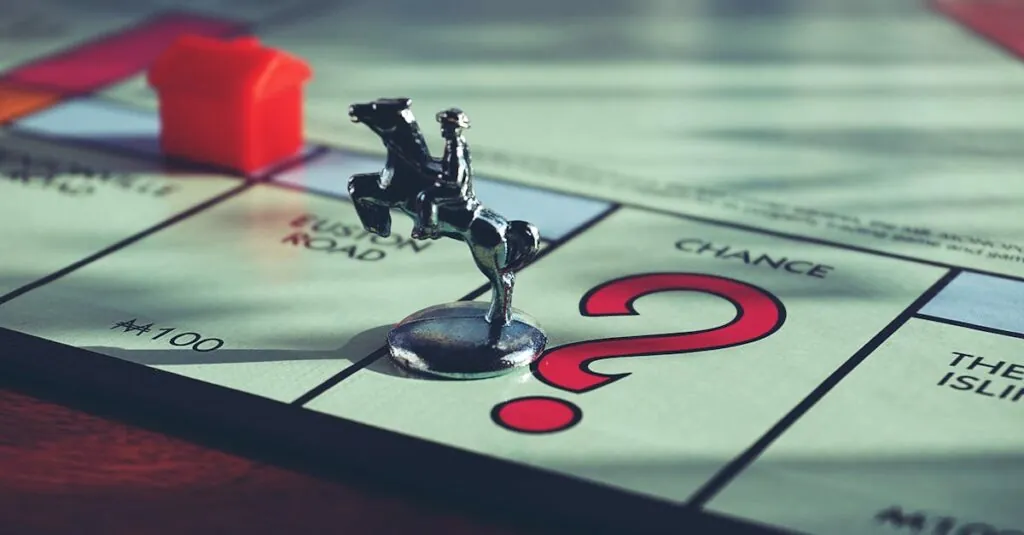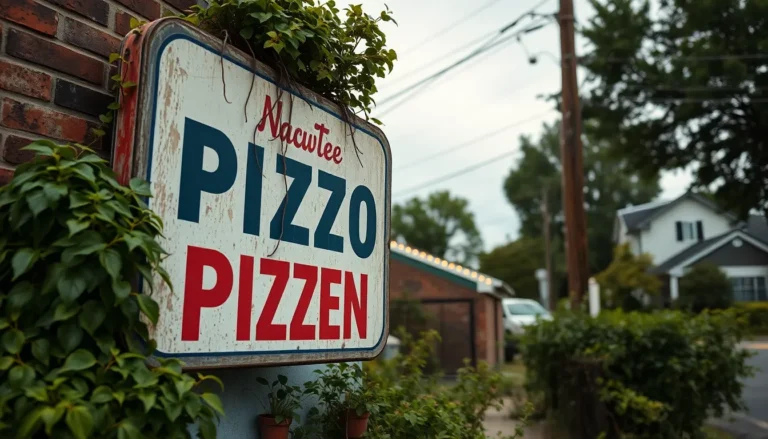Table of Contents
ToggleWhen it comes to building wealth, rolling the dice or spinning the wheel might seem like an exciting shortcut. Who wouldn’t want to turn a few bucks into a fortune with just a flick of the wrist? But let’s face it: games of chance are like that friend who promises to pay you back but always “forgets.” They might offer thrills but rarely deliver on the promise of riches.
Investing in games of chance is more like buying a ticket to a roller coaster than a ticket to financial freedom. The odds are stacked against players, and the house always wins—just like that one friend who always takes the last slice of pizza. So before diving into the world of lotteries, poker, or slot machines, it’s worth considering if this gamble is really the best way to grow your wealth.
Understanding Games Of Chance
Games of chance involve risking money on uncertain outcomes. These activities, such as lotteries, roulette, and slot machines, present alluring prospects for quick riches.
Definition And Examples
Games of chance refer to activities where outcomes rely primarily on luck rather than skill. Popular examples include lottery tickets, slot machines, and various table games found in casinos. Each example illustrates how players wager money, hoping for a favorable result. Lotteries operate by drawing random numbers, while slot machines generate results based on random number generators. Participation in any of these games highlights the unpredictable nature of outcomes.
Popularity And Appeal
Games of chance attract millions of players each year. The excitement of winning large sums captivates individuals, driving them to participate. Promotions and advertisements often emphasize the massive payouts, enhancing their allure. Friends and family sometimes influence involvement, creating social experiences around these activities. Despite the odds stacked against them, many people still believe in the possibility of a life-changing win. This belief fosters a persistent appeal, encouraging more participation.
The Mathematics Behind Games Of Chance
Games of chance operate on principles of mathematics that often discourage players from considering them sound investments. Understanding the underlying odds and probabilities reveals a clearer picture of why these games are risky endeavors for wealth building.
Odds And Probability
Understanding odds helps players grasp their chances of winning. For instance, lotteries may boast massive jackpots, yet the odds of winning the grand prize often exceed 1 in several million. Players frequently underestimate this disparity, believing their luck might change. Numbers illustrate that the probability of losing increases significantly with repeated play. Slot machines, with odds ranging from 1 in 100 to 1 in 10,000, also contribute to financial losses over time. Engaging in these games means facing a mathematical proposition designed to favor the house, not the player.
House Edge Explained
House edge stands as a crucial concept in gambling. This advantage assures that casinos make money over time. For example, in roulette, the house edge typically sits around 5.26 percent, diminishing players’ potential returns. Calculating this edge reveals that, despite hopeful winnings, a player loses more than they gain over the long term. Games like blackjack feature lower house edges, often near 1 percent; however, even these don’t guarantee success. Players consistently overlook the long-term outcomes dictated by this mathematical advantage, making wealth accumulation through games of chance a tricky proposition.
Financial Implications
Understanding the financial implications of games of chance clarifies why these activities rarely contribute to wealth building.
Short-Term Gains Vs. Long-Term Losses
Short-term wins in games of chance may feel exhilarating. Instant gratification often leads to repeated play, yet this excitement masks the inevitable long-term losses. Over time, the odds consistently favor the house, resulting in financial depletion rather than accumulation. Statistics reveal that most players lose money in the long run. In lotteries, for example, winning the jackpot involves odds exceeding 1 in several million, underscoring the inefficiency of relying on luck as a wealth strategy. Investing in stable, long-term options proves far more effective for true wealth growth.
Opportunity Cost Of Gambling
Investing time and money in gambling incurs significant opportunity costs. Resources spent on games of chance could support investments with higher returns, such as stocks or real estate. When gamblers choose this route, they miss out on the potential gains from more reliable financial ventures. Investments in diversified portfolios offer steadier growth and lower risks compared to the volatility of gambling. Financial analysts highlight the importance of considering these opportunity costs, indicating that sustained gambling undermines better investment strategies that lead to wealth accumulation.
Psychological Factors At Play
Psychological elements significantly influence decisions regarding games of chance. They can lead players to make poor investment choices, overshadowing rational thinking.
The Gambler’s Fallacy
Many players fall victim to the gambler’s fallacy, mistakenly believing that past outcomes influence future results. They might think a losing streak increases their chances of winning soon. This fallacy skews their risk assessment, often leading to larger bets than advisable. Players underestimate the independence of each game round, creating a false sense of control over luck. Research indicates that such misconceptions enhance the likelihood of continued losses. Understanding this ongoing cognitive bias helps explain why many struggle to break free from gambling cycles.
Risk Perception And Behavior
Perception of risk plays a crucial role in gambling behavior. Many individuals perceive themselves as having a higher chance of winning compared to reality, which drives them to participate further. The excitement of potential wins clouds practical judgment, resulting in risky financial decisions. Players tend to overestimate their ability to influence outcomes through strategies. Gamblers often ignore statistical evidence in favor of emotional impulses. Findings reveal that this skewed risk evaluation contributes to long-term financial losses, making it essential to recognize these psychological traps.
Alternative Ways To Build Wealth
Exploring wealth-building options reveals more reliable paths than games of chance. Traditional investments provide a foundation for financial growth.
Traditional Investment Strategies
Stocks, bonds, and mutual funds present structured ways to build wealth over time. Diversifying a portfolio mitigates risks while maximizing potential returns. Real estate investment offers consistent income through rental properties as values appreciate. Index funds provide a low-cost option for passive investors, promoting long-term growth without active management. Financial advisors often stress the significance of consistent contributions to investment accounts, emphasizing that compounding interest can amplify wealth significantly over decades.
Importance Of Financial Education
Understanding financial literacy significantly influences investment success. Knowledge of financial markets, asset classes, and risk management empowers individuals to make informed choices. Budgeting skills aid in discerning necessary expenditures from discretionary spending, freeing up funds for investment. Resources such as books, courses, and online workshops enhance one’s confidence in managing personal finances. Financial education encourages critical thinking about money, fostering habits that lead to sustainable wealth growth and avoidance of impulsive decisions, like those often seen in gambling scenarios.
Games of chance may offer fleeting excitement but they’re not a viable path to building wealth. The overwhelming odds against players make these activities more of a gamble than a smart investment. Relying on luck can lead to significant financial losses over time, overshadowing any short-term wins.
By understanding the risks and opportunity costs associated with gambling, individuals can make more informed decisions about their finances. Investing in reliable assets like stocks or real estate provides a much steadier route to wealth accumulation. Emphasizing financial education and disciplined investing habits will ultimately lead to greater financial stability and success.




